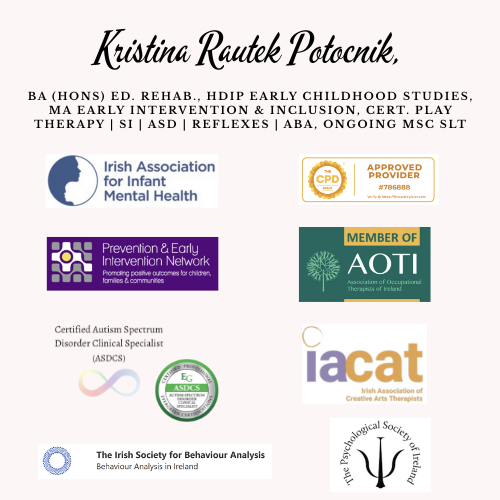The Importance of Tummy Time: Helping Your Baby Grow Strong and Healthy

Author: Kristina Rautek Potocnik, BA (Hons) Ed. Rehab., HDip Early Childhood Studies, MA Early Intervention & Inclusion, Cert. Play Therapy | SI | ASD | Reflexes, ongoing MSc SLT
The Importance of Tummy Time: Helping Your Baby Grow Strong and Healthy
In the first months of life, babies grow and learn very quickly. One simple but very important activity is tummy time—letting your baby lie on their stomach while they are awake and being watched. This helps your baby build muscles and explore the world around them.
Physical Development
Tummy time helps babies build strong muscles in the neck, shoulders, arms, and back. These muscles are important for lifting the head, learning to roll, crawl, and later walk. A study from Pediatrics (2019) showed that even a few minutes a day of tummy time helps babies with movement control and muscle strength. Over time, this supports healthy physical development.
Preventing Flat Head Syndrome
Many babies sleep on their backs, which is safest for sleep. But spending too much time on the back can sometimes lead to flat spots on the head. This is called plagiocephaly or brachycephaly. Tummy time helps by giving the baby a different position and taking pressure off the back of the head.
A 2018 study in the Journal of Craniofacial Surgery found that babies who had tummy time every day were less likely to develop flat head syndrome. Changing your baby’s position during playtime is a good way to help their head grow evenly.
Cognitive Development
Tummy time is also good for the brain. When your baby is on their tummy, they look around and use their eyes in new ways. They see toys, people, and lights from a different angle. This helps with vision, attention, and curiosity.
A 2020 study from Infant Behavior & Development showed that babies who had regular tummy time did better on tests that measure visual skills and focus. So, tummy time helps both the body and the mind grow.
Need Support? We’re Here to Help!
At NeuroNest, we offer friendly support and education for all parents—before and after your baby is born. If your baby doesn’t like tummy time or you have questions, you can join our one-time Tummy Time education session. It’s a great way to learn and feel more confident.
Latest Posts
- How children make sense of the world through their senses
- How your baby learns about the world through their senses
- Helping your child grow stronger through movement and play
- Understanding How Early Intervention Helps Children Learn, Move, and Connect
- How to Recognise Tactile Defensiveness and Help Your Child Feel Safe
- Understanding Feeding Challenges and How to Support Your Child at Home
- Let’s Talk Sitting: Exploring Floor Seating Options
- Retained Primitive Reflexes: The Hidden Cause Behind Developmental Struggles
- Where Curiosity Blossoms: How Children's Play Nurtures Growth for All
- Helping Your Child Through Stress: A Gentle Guide for Parents
- Sweet Little Lies – How to Recognise and Respond with Care
- Chores Are More Than Just Tasks – They’re a Tool for Growing Independence, Focus, and Confidence
- How to Help Children Develop Emotional Intelligence
- Blending Technology and Care: How VR Meta Quest Supports Children at NeuroNest
- A simple guide for parents who want to raise confident, happy children
- Setting Boundaries with Love: A Simple 3-Step Guide for Parents
- Understanding Behavior Through the Nervous System
- A Compassionate Lens on Dysregulation in Non-Speaking Autistic Individuals
- Supporting Development Through Movement: The Role of the Swing in Early Intervention
- Blending Tradition and Innovation: How NeuroNest Supports Your Child’s Unique Journey
- When Movement Meets Innovation: Supporting Child Development with GoBalance
- Why Visual Perception Matters for Everyday Life and Development
- Benefits of Chess in Early Intervention
- Building Healthy Nutrition from the Start
- A Journey Back to Your True Self
- Supporting Your Child’s Hand Skills for Confident Writing
- Blending the Best of Both Worlds
- Helping Toddlers Eat Well: A Parent’s Guide
- Why Tummy Time Matters for Your Baby's Development
- Helping Your Child Build Everyday Independence
- Who Are the Disconnected Kids?
- From First Tries to Automatic Habits: Understanding the Stages of Skill Learning
- Why a Child’s Level of Alertness Matters for Memory and Learning
- Early brain development starts before birth
- Why Slowing Down, Adapting Tasks, and Adding Breaks Helps Children Learn Better
- Why ADHD, Autism, Dyslexia and Other Challenges Need a New Approach
- The surprising power of copying in child development
- Books are more than just language tools—they’re powerful allies in sensory and motor development.
- Rethinking sensory support: moving beyond expensive rooms toward everyday understanding.
- Understanding how fear develops in a child’s brain
- Understanding how an early baby reflex can affect your child’s daily life
- A gentle start into baby development through movement and bonding
Our Partners



Our Memberships


